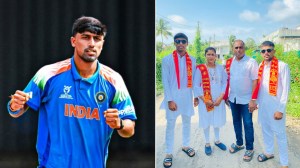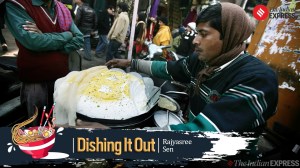Being touched
For the last five years, he has been living in Mumbai, working as a cleaner in an IT company. No one has ever enquired about his caste in this city. What he likes about this city is that one can live here, without being ruled.
 Never in his life has he seen such a crowd, or a curiousity for books in such a congregation. (Source: Getty Images)
Never in his life has he seen such a crowd, or a curiousity for books in such a congregation. (Source: Getty Images)
Raavan is a 21-year-old boy from the Vadar caste. For the last five years, he has been living in Mumbai, working as a cleaner in an IT company. No one has ever enquired about his caste in this city. What he likes about this city is that one can live here, without being ruled. Yet, it is his past that does not let him feel free, that reminds him of who he is. Here, his only solace is books. His search for himself is unknown to him. But codes of his destiny are hidden in his past, which appears in his dreams. He sees them, everyday.
His father Sidnak has just finished carving a beautiful statue of a god on the orders of the brahman (priest) of the village. As soon as he finishes, he is fascinated by the statue’s elegance and its fine curves and strokes. He feels the urge to be its first worshipper. So he seeks the priest’s permission. The brahman is furious, and says, “Bloody Vadar! You want to pollute our gods.” He orders the feudal caste people to thrash Sidnak, who is then beaten black and blue. When he is left alone, wounded, suffocating, he asks himself, “How can I pollute the god that I have created out of stone?” Having uttered this, he dies in Raavan’s lap.
His father died, bequeathing to him this question. The possibility of an answer, Raavan finds in books. So, everyday, in his break of 30 minutes, he finishes his food in 10 and reads for 20 minutes. After work, he reads books again, and, when he feels terribly lonely, he goes to a brothel in which, after copulation, he feels overpowered by two things: guilt and emptiness. Recently, he has discovered an app called Cinderella. This app helps people fulfill their emotional needs. With Cinderella, he loses his sense of time, his identity and the feeling of being judged. Cinderella responds to his needs without making him feel guilty or inferior. He almost feels like an equal while talking to her. He feels satisfied, but not fulfilled. As soon as he closes the app, he feels his loneliness transform into a punishment. Then, while masturbating, he tries to imagine Cinderella’s face, but, he simply can’t. He feels himself an unrecognisable being, rejected again and again.
He is in school, in 10th grade. This is the last day of school. After becoming infatuated with the smile of Indu, the village priest’s daughter, Raavan has developed secret feelings for her which he calls love. He likes her fair skin, slim body, and, accent, which teachers describe as the perfect and pure accent of the language. Today, he has decided to tell her what he feels for her. After gathering all his courage, during recess, when she is almost alone in the classroom, he goes to her. He murmurs his feelings before her. “Have you seen your dark face in the mirror? Look at yourself. It looks like you are made of tar,” is her furious response. And then she runs home and tells her parents. Her father, with a few feudal caste people from the village, comes to the school. Stunned and dejected, before he realises what is going to happen, Raavan finds himself beaten until he falls unconscious. “We do not want this blacky Vadar bastard to be in this school anymore. Expel him immediately,” they order the principal.
He wakes up to the sunlight coming through the broken window and the sound of local trains. He gets ready for work. Tasks on his to-do-list: clean the toilets, keep all the lavatory items in their place, and, then, be prepared to follow the orders of his supervisor. Most of the employees in this office are women, apparently from rich families. He finds people in the office pompous and pretentious. But he is jealous of and secretly resentful of Bobby, the dog owned by Parul Kulkarni, who is the head of the company. She frequently orders Raavan to take care of Bobby and to make sure the dog plays until the end of the workday. Raavan often wonders: What makes a human treat another human like a dog? What makes a human consider a dog more precious than a human? Why, in this country, do some animals live better lives than human beings?
These questions ceaselessly stream through his mind. Amrapali, who also works in the same office as a software consultant, has been observing Raavan since he started working there. She is amused by his association with books. They never talked, though. She decides to know his bookish self. At lunchtime, she goes out and finds him under the banyan tree, reading a book. He feels anxious, seeing her in front of him. Her questions render him speechless because, ever since he was beaten in his village, he has grown unaccustomed to talking to women. He nods to her questions. “Day after tomorrow is Babasaheb’s death anniversary. Like every year, a big book market will be there. I am sure you want to visit it.” she says, smiling, and convinces him to come.
After Raavan is beaten up, he is left alone. No one wants to touch him. Someone goes and tells his mother. She comes running. Looking at her son’s condition, she is furious, but she does not cry or yell. She takes him home, carrying him on her back, crushes herbs to apply to his wound and consoles him with her words. She is a diligent woman. Her work not only shapes her muscles but her sense of resistance, too. Under her care, he regains strength in a few days. Then, she persuades him to leave the village. After some days, he gets the news that his mother has killed the priest and all the feudal goons who had beaten him. But, in retaliation, she too, has been killed.
He wakes up to Amrapali’s words. When they meet later, they walk towards Chaityabhoomi. He sees himself in a sea of people, wearing white clothes. Some are waving the blue flag; some are waving the panchsheel (five colour) flag. There is cacophony all around, but, surprisingly, he feels accepted and alive in its midst. They enter Shivaji Park. As they walk, making space for themselves through waves of people, Amrapali shows him the lanes full of bookshops. He can see photos of Ambedkar, the Buddha and innumerable books all around him. Never in his life has he seen such a crowd, or a curiousity for books in such a congregation. He remembers that in his village, people of Ambedkar’s caste — and Ambedkar himself — have never been regarded with esteem. As Amrapali explains Ambedkar’s significance, his work, the movement he led and the struggle of people to Raavan, everything begins to make sense to him.
In the evening, to help him walk back through the crowd, she holds his hand. She is the only woman, after his mother, who has touched him. He feels the same healing element in her touch as in his mother’s. Her touch is almost like an ointment to the wound that had assaulted and injured his subconscious long back. It comes from compassion as well as intelligence, he knows. Somewhere in his diary, he has written that both factors are responsible for transforming the magic of love into reality. He also remembers a poem he has written in it:
I don’t want to think of you with a sweat degraded by
the stench of your perfume
I want to think of you
with a sweat that smells of your history
of struggle and of rising above it
It’s been ages since he was touched by a woman. With Amrapali’s touch, he
feels accepted.
He asks her, “Why have you brought me here?” She says, “You are in search of a life of the mind. This is rare in today’s time. That is what I like about you.”
When he wakes up the next day, he remembers seeing no dream. He realises: in love, human personality is resurrected by and for the beloved.
- 01
- 02
- 03
- 04
- 05































